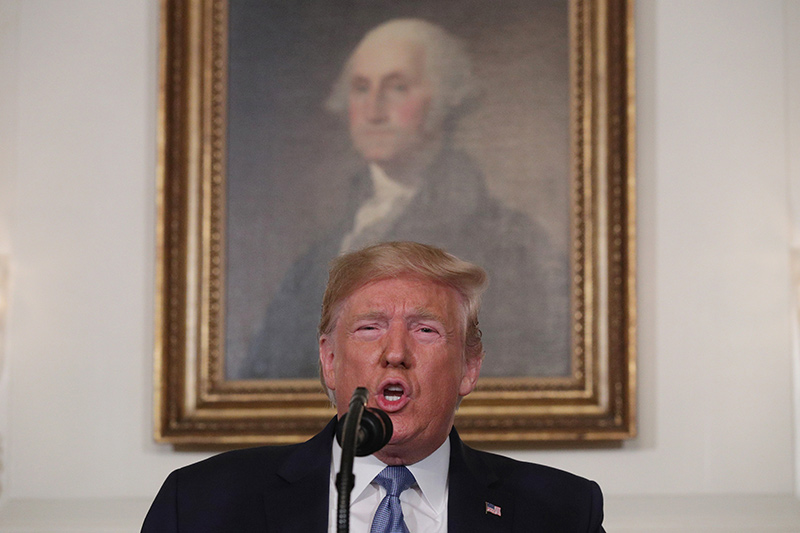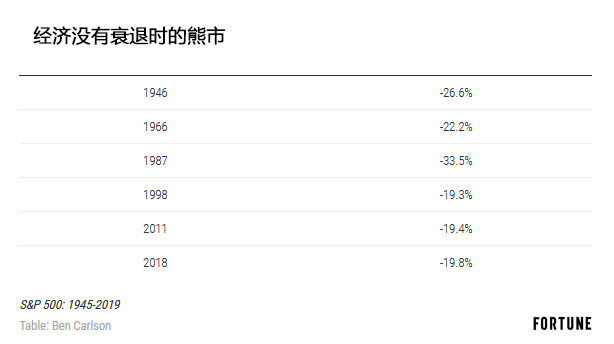股市走势能影响特朗普连任吗?

|
在7月26日创历史新高后,标普500指数连跌六天,下滑6%。许多人都把股市迅速回落归咎于特朗普总统的对华贸易战以及人民币汇率大幅下降造成紧张局势不断升级。 这不是美国股市第一次如此迅速地下挫,也不会是最后一次。但在大选年还有几个月就要到来的情况下,值得考虑一下不利行情延续到2020年对特朗普总统的连任可能性会有什么样的影响。 1928年至今,美国已经进行了23次总统选举,其中标普500指数在大选年下跌的只有四次(最近的一次是2008年,跌幅为37%)。另外,现任总统谋求连任的有13次。 在上述13次现任总统谋求连任的选举中,标普500指数收益率为负的只有两次,分别是1932年和1940年,该指数分别下跌了8.6%和10.7%。1932年,富兰克林·罗斯福击败了意图连任的赫伯特·胡佛;1940年罗斯福则实现连任,战胜了对手文多尔·威尔吉。因此,就现任总统谋求连任时股市是否下跌而言,并无太多先例可循。 经济,愚蠢 1992年比尔·克林顿向当时的总统老布什发起挑战时,其竞选助手詹姆斯·卡维尔在克林顿的选举总部挂起了一面牌子,上面写着需重视的三大要点: 1. 改变还是更多地保持原样 2. 经济,愚蠢 3. 别忘了医疗 在决定总统的连任可能性方面,这块牌子上的第二条可能远比股市重要。1928年至今,在现任总统谋求连任的13次尝试中,失败的只有三次,而且都出现在衰退刚刚过去的时候。 富兰克林·罗斯福在1932年轻松击败了当时的总统赫伯特·胡佛,而1929年胡佛上任时美国正要出现大萧条,许多人都觉得胡佛的政策实际上让大萧条期间的情况变得更加糟糕。 1980年,罗纳德·里根战胜了总统吉米·卡特,而当年的经济衰退一直延续到了夏天,失业率一度接近8%。利率快速上升,通胀率也失去了控制。里根以压倒性优势当选。 现任总统最后一次谋求连任失败是在1992年,当时克林顿的重点是“经济,愚蠢”。这句口号起作用的原因是1990年夏天出现的美国经济衰退一直延续到了1991年大选期间。失业率最高几乎达到8%。20世纪90年代初,美国许多地区的房价都出现了几十年来的最大跌幅。 其他谋求连任并且成功的总统(罗斯福、艾森豪威尔、尼克松、里根、克林顿、小布什和奥巴马)在第二次参选前都没有遭遇到经济衰退。 熊市,无衰退 股市明年暴跌,从而在经济未衰退时陷入熊市的可能性一直存在。以前出现过这种情况,今后也仍然有可能发生,原因是投资者不是非常善于通过股价来预测经济走势。 1945年以来,标普500指数在经济没有衰退时下跌10%或更多的情况出现过18次,其中的6次形成了熊市。 |
After hitting new all-time highs on July 26, the S&P 500 was then down six days in a row, falling 6%. Many are blaming this swift correction on President Trump’s trade war with China and the escalating tensions from the massive currency devaluation in the Yuan. This is not the first time the stock market has fallen so quickly nor will it be the last. But as we head into an election year in several months, it’s worth considering what could happen to President Trump’s re-election hopes if the market’s woes spill into 2020. Going back to 1928, there have been 23 presidential elections. Only 4 of those 23 elections experienced a loss in the S&P 500 during the election year itself (the most recent being the 37% loss in 2008). In 13 of those elections, the sitting president was seeking re-election. The S&P 500 saw a negative return in just two of those re-election years, 1932 and 1940. Stocks were down 8.6% and 10.7%, respectively in those years. In 1932, FDR defeated Herbert Hoover, who lost his re-election bid while FDR was re-elected in 1940 over Wendell Willkie. So there’s not much precedent in terms of stocks seeing a down year during a re-election campaign. The economy, stupid When Bill Clinton ran against then-President George H.W. Bush in 1992, James Carville hung a sign in the Clinton campaign headquarters with three phrases on it for what to focus on: 1. Change vs. more of the same 2. The economy, stupid 3. Don’t forget healthcare Number two on the list is likely far more important than the stock market in determining a president’s re-election chances. Out of the 13 times a president has been up for re-election going back to 1928, there were only three times when the incumbent lost the presidency. Each of those instances came just after a recession. Franklin D. Roosevelt handily defeated Herbert Hoover, the incumbent president, in 1932. The country was just about to enter the Great Depression when Hoover took office in 1929, and many felt his policies actually made things worse throughout the economic carnage. Ronald Reagan defeated then-President Jimmy Carter in 1980, a year in which the country experienced a recession that lasted well into the summer and saw the unemployment rate spike to nearly 8%. This was also during a period of rapidly rising interest rates and runaway inflation. Reagan won by a landslide. The last time a sitting president lost their re-election bid was in the 1992 election when Clinton focused on “the economy, stupid.” This slogan worked because the U.S. economy slid into a recession during the summer of 1990 that lasted well into the 1991 campaign trail. The unemployment rate topped out at almost 8%. The early-1990s was also a time where real estate prices fell in many regions the most they had in decades. None of the other incumbent presidents who ran for re-election in that time and were victorious (Roosevelt, Eisenhower, Nixon, Reagan, Clinton, Bush and Obama) were forced to deal with a recession in the run-up to the election. Bear market, no recession It’s always possible the stock market could crash next year and go into a bear market outside of a recession. This has happened in the past and it will likely happen in the future as investors aren’t very good at forecasting the economy through stock prices. Since 1945, there have been 18 instances where the S&P 500 sold off 10% or worse outside of a recession. Six of those sell-offs would constitute bear markets. |

|
不过,就算美股在选举前确实下跌,总统连任面临的最大经济风险也还是经济放缓。盖洛普的一项调查显示,以各种形式持有股票的人约占美国人口的一半。但股票往往集中在上层,或者说美国10%的富人持有几乎九成股票。因此,股市已经不像以前那样具有平民特色。 衰退的影响更深远,因为人们会失业,他们的住房可能贬值,公司也会倒闭。这时人们会对政客感到愤怒。经济滑坡时股市也可能下跌,但就总统连任的可能性而言,经济看来比股市重要。(财富中文网) 译者:Charlie 审校:夏林 |
But even if the stock market did fall between now and the election, an economic slowdown would still likely be the president’s biggest economic risk for re-election. According to a Gallup poll, roughly half of Americans own stocks in some form. But those holdings tend to be concentrated at the top, with the top 10% in wealth owning almost 90% of the stocks in the U.S. So the stock market doesn’t have a hold over the populace as it once did. Recessions are felt more far and wide because people lose jobs, their housing prices likely fall, and businesses fail. That’s when people become angry at politicians. Stocks would also likely fall in an economic slowdown but it appears the economy is more important than the stock market when it comes to re-election chances for the president. |













